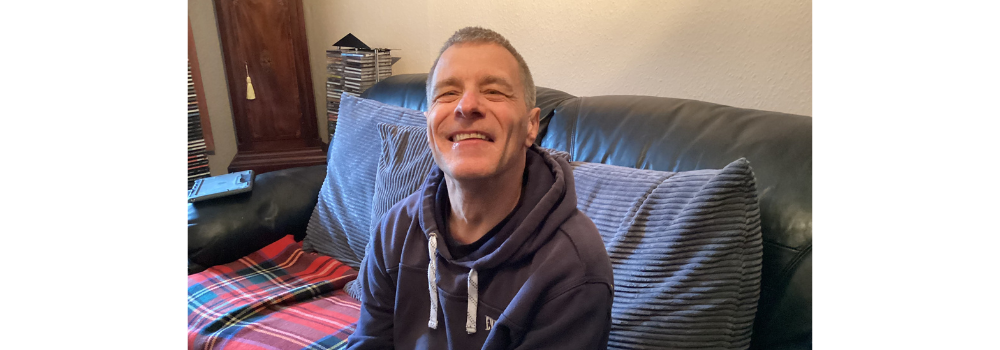The University of Dundee has a long history of research into Augmentative and Alternative Communication (AAC) – ways to support communication for those who have difficulties using speech.
AAC user Alan McGregor writes about he got involved with Dundee University and their Straight Talking expert user group.
I first got involved with Dundee University in around 1986 when my speech therapist asked Dr Norman Alm from the computing department at the university if he would like to help me in school with my new speech device which was a Vois135. Dr Alm helped me with storing different words and phrases and where they were saved in the vois135 for me to find and use.
We grew to be good friends over this time and in 1989 I asked if I could help out with him working on Augmentative and Alternative Communication (AAC) at the University. The first project we worked on was software called Floorgrabber which we started from scratch which was used on an early Apple Desktop and a laptop computer. We took this software to the United States, Australia and Japan in the early 90s to demonstrate how it worked with me giving talks to Speech and Language Therapists and AAC users. I mostly talked about my swimming career and the work we were doing at the university.
In 1990 with the university team we travelled to Stockholm, Sweden. At this time I think there were only two or three AAC users working with Dr Alm at the university and we attended the International Society for Augmentative and Alternative Communication (ISAAC) conference. This was an eye opening experience for me, seeing all of these AAC users in one place, all using different hardware and software to enable them to speak. Not to mention all of the AAC specialists, Speech and Language therapists, software and hardware engineers and doctors, all in one place, all with same aim… to help people to talk.
Over the years I continued to help out with the University, giving talks, testing software, developing ideas and attending conferences. In 2010, Professor Annalu Waller started the Straight Talking Group. This helped us to attract some more AAC users to work with the University which gave us a larger range of experiences and ideas to work with.
Around that time, Professor Waller started the Straight Talking Group working on a new project. Annalu asked the group if we would be interested in doing sessions with student doctors which would involve giving a short presentation and meeting with them in small groups to encourage them to ask us questions and have conversations with us about our experiences in hospitals and local practices. The purpose of these sessions was to help the students understand what difficulties they might face when they treat or diagnose a non verbal communicator. Members of the group were able to retell stories about communication aids being locked away for safe keeping, not getting meals and not being spoken to directly, the doctors would speak to the parents and carers. These sessions give the students a bit of experience at communication for when they later may have to help someone else who does not talk. I feel that these sessions can be very helpful for the students and we all hope that it is of some benefit to others like us. We still do these sessions every year with 2nd year and 4th year medical students.
The group continues to work on software development ideas, some of our suggestions are offered to computing students to work on as projects for their courses. We have in the past been approached by software companies to do user testing and feedback. The software testing and idea development is my personal favourite part of it all, I love to see an idea we have come up with turned into a reality.
There is a lot of talk around Artificial intelligence and how AI can help with AAC, I had proposed a software idea in the past which would use AI/speech recognition to “hear” the conversation and offer real time suggestions to enable an AAC user to join in with the conversation much quicker. This is an area which I hope can be developed by some very clever people to help us communicate much faster than we can right now.
At the moment the group is working towards a mentoring qualification which ties in to the sessions we are doing with the student doctors as we have a mentoring role with them. In the future I hope we can also use the mentoring qualification to help other non verbal communicators to build confidence and realise their potential.
More information about how to get involved with the Straight Talking Group can be found https://aac.dundee.ac.uk/stg/
